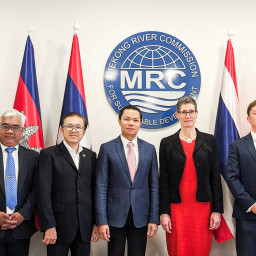Lively discussion on the findings and results of the Council Study in Vietnam
On 13 March 2018, a briefing on results of the Study on Sustainable Management and Development of the Mekong River Including the Impact of the Hydropower Development Projects - known as the ‘Council Study’ ,was organised in Ho Chi Minh city, Vietnam by Vietnam’s Ministry of Natural Resources and Environment (MONRE) through Vietnam National Mekong Committee (VNMC) and Mekong River Commission Secretariat (MRCS). Deputy Minister Tran Quy Kien participated and chaired the meeting together with Director General of the VNMC Le Duc Trung and MRC CEO Pham Tuan Phan.
A team of specialists from the Mekong River Commission Secretariat reported key findings from this MRC’s flagship study to around 40 participants from Vietnam National Mekong Committee and relevant line agencies , academic institutions, civil societies and NGOs (link to list of participants). The participants expressed their high appreciation for the Study’s comprehensiveness and necessity and the MRCS for its efforts to complete the Study in time. They also requested for more detailed information and for recommendations to apply the findings into Vietnam’s context.

Deputy Minister Tran Quy Kien emphasised: “I highly appreciate the Mekong River Commission for completing this important Study. I would like to thank participants of this meaningful meeting today for contributing valid comments to the Study which is vital for the Mekong Delta and contributes to the agenda of the Government of Vietnam to sustainably develop the Mekong Delta in adaptation to climate change. I recommend VNMC to carefully review the Study’s results and provide recommendations for further studies and for better cooperation among the MRC member countries in sustainable management of the Mekong river basin”.
CEO Pham Tuan Phan said: “We are pleased to share with you this integrated, cross-sectoral, comprehensive and state-of-the-art study supporting sustainable development in the Mekong Basin. We would like to welcome opportunities to work with other stakeholders to study further and to better manage the water resources of the Mekong river”.
Prof. Dr. Nguyen Ngoc Tran, Member of Vietnam National Assembly valued efforts of the MRC to undertake a huge workload to complete the comprehensive Study. However, he emphasises that: “We need to have a better perspective on the sediment impact to the Mekong Delta. It does not only negatively impact to agriculture and aquaculture but also cause the changes of land structure at the Mekong Delta, increasing salinisation and coastal erosion near the Mekong Delta.”
The Council Study was conducted by the Mekong River Commission (MRC) from 2012 to 2017. Following a number of technical consultations at the regional and national levels, as well as stakeholder feedback at open forums, the final report was refined for publishing in mid-February 2018. On 18 December 2017, it was reported to 4 Mekong prime ministers, the key messages from the study in a letter and offered briefings on the report of more than 3,600 pages to prime minister offices.
Key findings and messages are now being reported in a series of national meetings in the member countries by teams of MRC Secretariat staff. On 23 January 2018, a comprehensive reporting on the assessment results were delivered by the MRCS to a national technical meeting of the Lao National Mekong Committee Secretariat and relevant line agencies. Then, on 26 January 2018, a high-level meeting of the Lao National Mekong Committee members, chaired by the Minister of Natural Resources and Environment, with participation from vice ministers and directors-general of all key line agencies.
A briefing was delivered to Embassy of Vietnam in Vientiane on 6 February 2018, with the participation of the Vietnamese Ambassador and diplomatic officials. On 28 February 2018, an intensive workshop for 60 representatives from Cambodia National Mekong Committee and its line ministries and agencies was conducted. On 13 March 2018, at the same day with the briefing in Vietnam, Thailand National Mekong River Committee held a meeting to update Thai Government on the Study.
The Council Study aims to provide an objective scientific assessment of the environmental, social and economic costs and benefits of existing and planned water resource developments in the Lower Mekong Basin to inform decision makers. The study results will be integrated into the MRC knowledge base to enhance the Basin Development Planning process. It also helps promote capacity and ensure technology transfer to the Member Countries.
It used a sequence of qualitative and quantitative models to examine a set of water resource development scenarios. The modelling outputs were integrated as a systematic framework to describe outcomes for selected environmental, social and economic indicators, and to carry out assessments. These, in turn, informed the social and economic analysis of six thematic sectors. The framework provides a coherent, scientific foundation for the assessment of water resource developments, and is complemented with accessible, practical methodologies and modelling tools, and a knowledge base to support further studies, deliberations and decision-making processes.
The study asses both positive and negative impacts of different water development scenarios on the Lower Mekong Basin, focusing on 15 km corridor on both sides of the Mekong mainstream, Tonle Sap area and Mekong delta. It was designed to be flexible, transparent and replicable to accommodate improved data management and continued refinements of the assessment tools.





